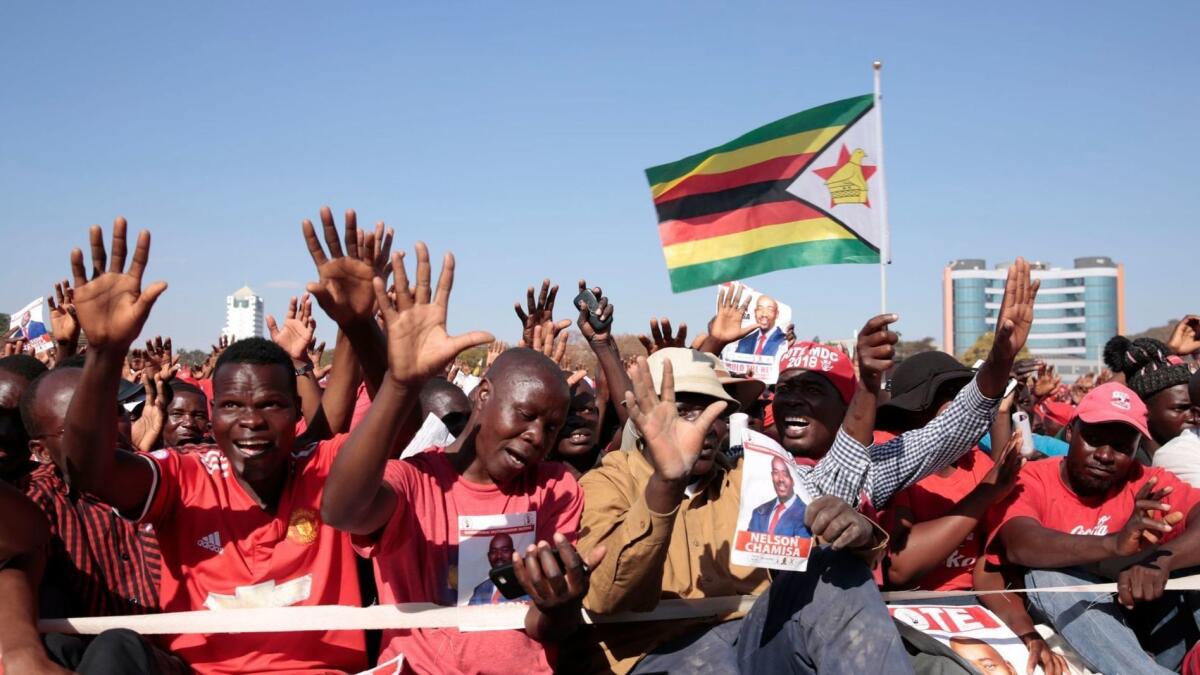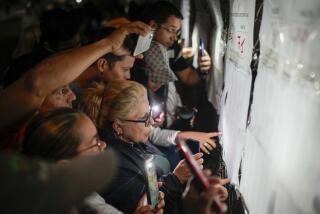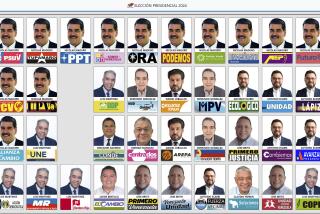Zimbabwe’s presidential contest pits 40-year-old lawyer against 75-year-old successor to strongman Robert Mugabe

Reporting from HARARE, Zimbabwe — For the first time since Zimbabwe achieved independence in 1980, Robert Mugabe will not appear on the presidential ballot, and two men vying for the presidency wrapped up their campaigns Saturday by promising to take the country in a new direction.
At a campaign rally at the National Sports Stadium in Harare, President Emmerson Mnangagwa pitched his vision of a “new Zimbabwe.” A few blocks away, his principal challenger, Nelson Chamisa, delivered his final campaign speech from behind a lectern emblazoned with the words “Behold the New.”
Both candidates have promised to end Zimbabwe’s self-inflicted isolation, revive its wasted economy and create jobs, a prospect of particular importance to millions of young voters who face dismal prospects in the workplace. The question facing voters Monday: Who is best equipped to do it?
Mnangagwa, Mugabe’s ally and appointed successor after he was forced to step down by the military in November, has been on the road for weeks to convince more than 5 million registered voters that ZANU-PF, a party that has governed for nearly four decades, can lead this weary nation into a new era of prosperity.
“I’ve heard the voices of all our people,” Mnangagwa said in a speech delivered to stands that were about two-thirds full. “We need a better, prosperous, united Zimbabwe.”
Mnangagwa rode into the National Sports Stadium atop a sleek black pickup, pumping his fists toward the stands, wearing a yellow cap and jacket adorned with his own smiling portrait.
There are not enough demons in hell to stop the will of Zimbabwe.
— Nelson Chamisa
The contest between Mnangagwa, 75, and Chamisa, the 40-year-old lawyer who heads the opposition Movement for Democratic Change party, has tightened in recent weeks as the two candidates have campaigned aggressively around the country. Campaigning is not allowed the day before an election, so both parties held their final rallies Saturday in the capital before polls open Monday morning.
But for longtime ZANU-PF supporter Privilege Siviko, there is no contest. “Mnangagwa is the only one who can turn around the economy,” said the 45-year-old security guard. “That one,” he said, referring to Chamisa, “is a schoolboy. He’s not a political leader.”
A few blocks away, thousands of opposition supporters dressed in MDC’s trademark red sat in a dusty clearing in the afternoon sun, waiting for Chamisa to speak.
“There are not enough demons in hell to stop the will of Zimbabwe,” Chamisa shouted to an exuberant crowd, cracking jokes in the Shona language and delivering neat, social-media-friendly sound bites in English. “People are voting for change. People are voting for the new. People are voting for the young.”
“He’s an Obama,” said 45-year-old supporter Stanley Gama, who has been following Chamisa around the country. “He knows what the people want and he speaks to the people.”
With past elections tainted by allegations of vote-rigging and violence, Mnangagwa has opened up Monday’s vote to international observers for the first time in years.
The run-up to the vote has been largely peaceful, and supporters of both parties say the political environment feels more open and tolerant than in other years.
But human rights groups have warned of intimidation and harassment in recent weeks, while the United Nations has expressed concern over reports in rural areas of “voter intimidation, threats of violence, harassment and coercion, including people being forced to attend political rallies.”
For weeks, Chamisa and other observers have condemned the electoral process, claiming the country’s electoral commission has shown bias in favor of the ruling party, among other complaints. Chamisa has warned he has the support of thousands — enough to shut down Zimbabwe’s major cities if he were to call for street protests.
Final results from Monday’s balloting may not be known for days. There are several candidates, and an especially close result could lead to a runoff in September, raising fears of a repeat of the deadly violence that erupted 10 years ago when a runoff was called. Others worry that if the opposition wins, the military might step in again after their successful intervention last fall.
In the case of Alice Nsharu, an 18-year-old student and MDC supporter who attended Chamisa’s last rally, she has had enough of ZANU-PF.
“It was always Mugabe, Mugabe, Mugabe, Mugabe. Now it’s his twin brother, Mnangagwa?” she asked. If ZANU-PF wins again this time, she said, “I won’t accept it. If they say we failed, obviously we’re going to the streets.”
Mahr is a special correspondent.
More to Read
Sign up for Essential California
The most important California stories and recommendations in your inbox every morning.
You may occasionally receive promotional content from the Los Angeles Times.










